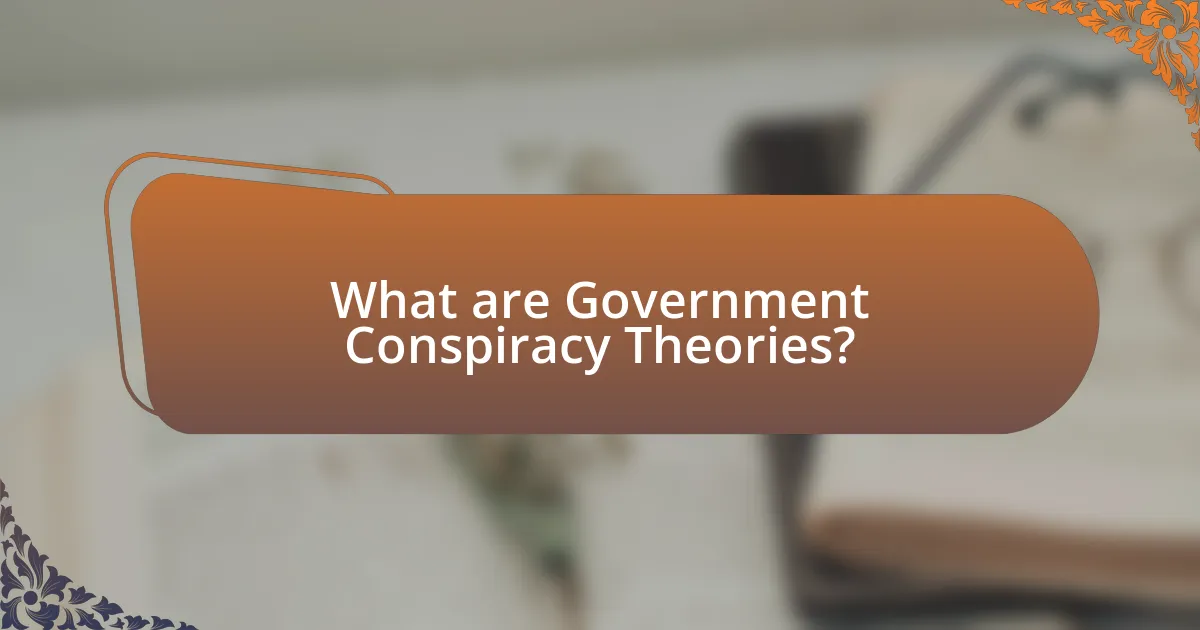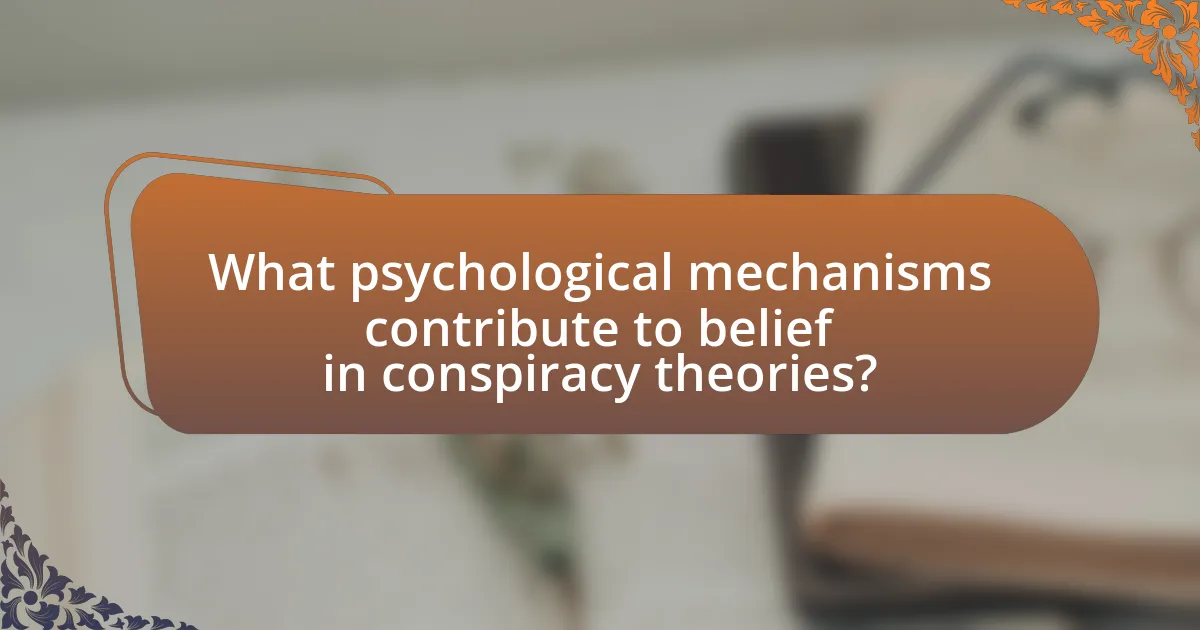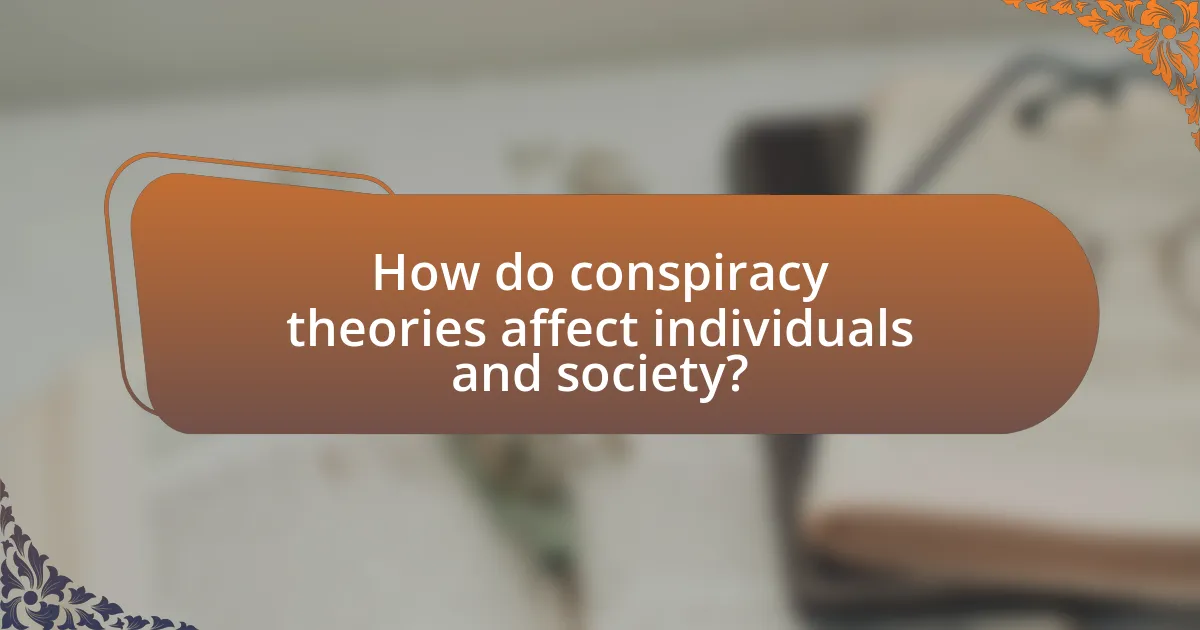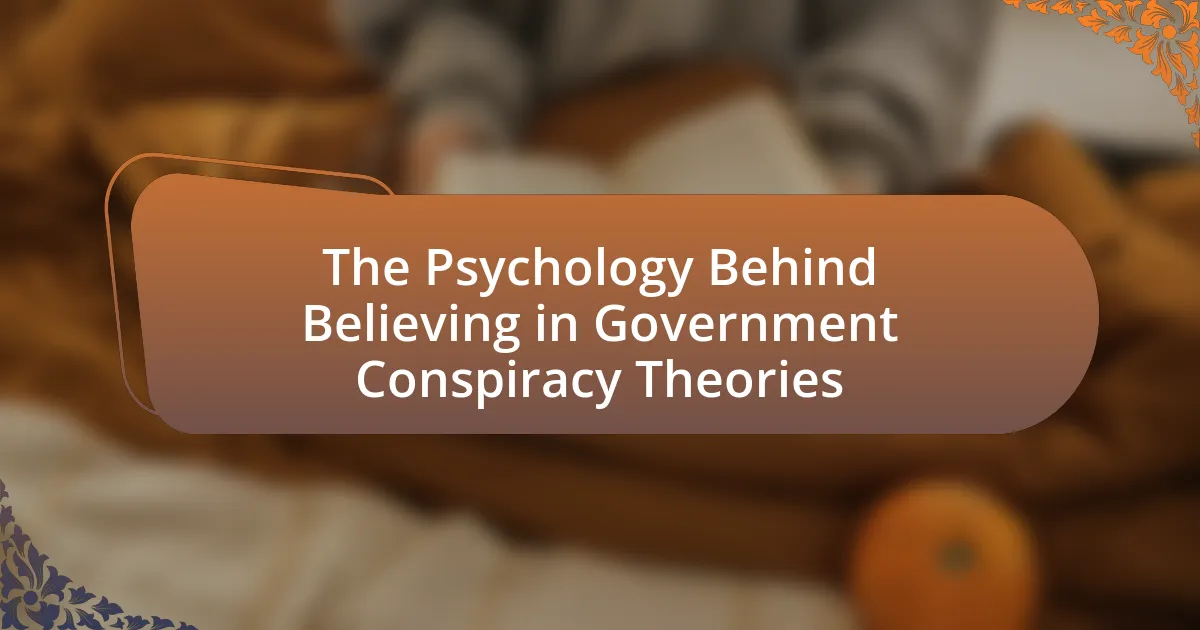Government conspiracy theories are beliefs suggesting that government entities engage in secretive and often harmful activities hidden from the public. These theories typically emerge from a distrust of official narratives, fueled by cognitive biases and social dynamics, particularly in times of uncertainty. Historical events such as the Watergate scandal and the assassination of President John F. Kennedy have intensified public skepticism, leading to the proliferation of conspiracy theories. The article explores the psychological mechanisms behind these beliefs, including cognitive biases like confirmation and proportionality bias, the influence of social identity, and the implications for mental health and political behavior. Additionally, it discusses strategies for critical evaluation of conspiracy theories and the role of media literacy in combating misinformation.

What are Government Conspiracy Theories?
Government conspiracy theories are beliefs that suggest government entities are involved in secretive, often malicious activities that are hidden from the public. These theories typically arise from events or situations where the official narrative is perceived as inadequate or misleading, leading individuals to speculate about alternative explanations. For instance, the Watergate scandal revealed real government misconduct, which fueled public distrust and gave rise to various conspiracy theories about government operations. Such theories often thrive in environments of uncertainty and can be reinforced by social media and group dynamics, as seen in the proliferation of theories surrounding events like 9/11 or the COVID-19 pandemic.
How do government conspiracy theories originate?
Government conspiracy theories originate from a combination of distrust in authorities, cognitive biases, and social dynamics. Individuals often perceive government actions as secretive or deceptive, leading to skepticism and the belief that hidden motives exist. Cognitive biases, such as confirmation bias, cause people to favor information that supports their pre-existing beliefs while dismissing contradictory evidence. Additionally, social factors, including group identity and the influence of social media, amplify these theories by creating echo chambers where misinformation can thrive. Historical examples, such as the Watergate scandal, illustrate how real government misconduct can fuel conspiracy theories, reinforcing the notion that authorities cannot be trusted.
What historical events have fueled government conspiracy theories?
Historical events that have fueled government conspiracy theories include the Watergate scandal, the assassination of President John F. Kennedy, and the Iran-Contra affair. The Watergate scandal, which involved a break-in at the Democratic National Committee headquarters and subsequent cover-up by the Nixon administration, led to widespread distrust in government officials and institutions. The assassination of John F. Kennedy in 1963 sparked numerous theories regarding the involvement of various groups, including the CIA and organized crime, due to the lack of consensus on the official narrative. The Iran-Contra affair, where senior officials secretly facilitated the sale of arms to Iran to fund Contra rebels in Nicaragua, further eroded public trust and fueled speculation about government deception. These events exemplify how significant political scandals and controversies can lead to a belief in conspiracy theories surrounding government actions.
How do cultural factors influence the creation of these theories?
Cultural factors significantly influence the creation of government conspiracy theories by shaping individuals’ beliefs, values, and social norms. For instance, societies with a high level of distrust in government institutions often produce more conspiracy theories, as seen in countries experiencing political turmoil or corruption, where citizens may feel alienated and seek alternative explanations for events. Research by Goertzel (1994) indicates that cultural narratives and historical contexts, such as collective trauma or past injustices, can also contribute to the prevalence of conspiracy thinking. These cultural elements create a fertile ground for conspiracy theories to emerge, as they resonate with the shared experiences and fears of the community.
Why do people believe in government conspiracy theories?
People believe in government conspiracy theories primarily due to a combination of cognitive biases, social influences, and a distrust of authority. Cognitive biases, such as the proportionality bias, lead individuals to perceive significant events as being caused by intentional actions rather than random occurrences. Social influences, including group identity and the need for belonging, can reinforce these beliefs within communities that share similar views. Additionally, historical instances of government deception, such as the Watergate scandal, contribute to a pervasive skepticism towards official narratives, making conspiracy theories more appealing as alternative explanations.
What psychological needs do these beliefs fulfill?
Beliefs in government conspiracy theories fulfill several psychological needs, including the need for control, certainty, and social belonging. These beliefs provide individuals with a sense of agency in an unpredictable world, allowing them to feel that they can understand complex social phenomena. Research indicates that when people perceive a lack of control, they are more likely to endorse conspiracy theories as a way to regain a sense of order (Whitson & Galinsky, 2008). Additionally, these beliefs can foster a sense of community among like-minded individuals, satisfying the need for social connection and identity. This social aspect is reinforced by the fact that conspiracy theories often thrive in group settings, where shared beliefs create a bond among members.
How does cognitive bias play a role in belief formation?
Cognitive bias significantly influences belief formation by shaping how individuals process information and interpret evidence. Cognitive biases, such as confirmation bias, lead people to favor information that supports their pre-existing beliefs while disregarding contradictory evidence. For instance, research by Nickerson (1998) highlights that individuals are more likely to seek out and remember information that aligns with their beliefs, reinforcing those beliefs over time. This selective exposure to information can create echo chambers, where individuals become increasingly entrenched in their views, particularly in the context of government conspiracy theories.

What psychological mechanisms contribute to belief in conspiracy theories?
Belief in conspiracy theories is primarily driven by psychological mechanisms such as cognitive biases, social identity, and a need for control. Cognitive biases, including the proportionality bias, lead individuals to perceive significant events as being caused by intentional actions rather than random occurrences. Social identity theory suggests that individuals align with groups that share their beliefs, reinforcing their conspiracy views and creating an in-group versus out-group mentality. Additionally, the need for control and certainty drives people to seek explanations for complex events, often resulting in the acceptance of conspiracy theories as they provide simple answers to complicated questions. Research by Goertzel (1994) found that individuals with lower levels of trust in government and higher levels of anxiety are more likely to endorse conspiracy beliefs, further supporting the link between psychological factors and conspiracy theory acceptance.
How does social identity influence belief in conspiracy theories?
Social identity significantly influences belief in conspiracy theories by shaping individuals’ perceptions and interpretations of information. People often align their beliefs with those of their social groups, leading to a tendency to accept conspiracy theories that resonate with their group’s identity and worldview. Research indicates that individuals who strongly identify with a particular group are more likely to endorse conspiracy theories that portray their group as a victim or under threat, as seen in studies by Goertzel (1994) and van Prooijen & Jostmann (2013). These studies demonstrate that social identity can create an in-group bias, where individuals are more inclined to believe narratives that support their group’s interests and perspectives, reinforcing their commitment to those beliefs.
What role does groupthink play in reinforcing these beliefs?
Groupthink plays a significant role in reinforcing beliefs in government conspiracy theories by promoting conformity and discouraging dissent within groups. When individuals share a common belief in a conspiracy theory, groupthink leads to an environment where critical thinking is suppressed, and alternative viewpoints are marginalized. This phenomenon is characterized by a desire for harmony and consensus, which can result in the amplification of shared beliefs and the dismissal of contradictory evidence. Research by Janis (1972) highlights that groupthink can lead to poor decision-making and a lack of critical analysis, further entrenching the group’s beliefs in conspiracy theories.
How do in-group and out-group dynamics affect perceptions of conspiracy theories?
In-group and out-group dynamics significantly influence perceptions of conspiracy theories by shaping individuals’ beliefs based on their social affiliations. Members of an in-group are more likely to accept conspiracy theories that align with their group’s worldview, reinforcing their identity and solidarity, while dismissing those that contradict it. Conversely, individuals in an out-group may view conspiracy theories skeptically, often perceiving them as threats to their beliefs or values. Research indicates that social identity theory explains this phenomenon, as individuals derive part of their self-concept from their group memberships, leading to biased interpretations of information that favor their in-group. For example, a study by Goertzel (1994) found that individuals who strongly identify with a particular political group are more likely to endorse conspiracy theories that implicate opposing groups, demonstrating how in-group loyalty can distort perceptions of reality.
What cognitive biases are commonly associated with conspiracy beliefs?
Cognitive biases commonly associated with conspiracy beliefs include confirmation bias, proportionality bias, and the illusory truth effect. Confirmation bias leads individuals to seek out information that supports their pre-existing beliefs while ignoring contradictory evidence. Proportionality bias causes people to believe that significant events must have equally significant causes, often attributing complex societal issues to deliberate conspiracies. The illusory truth effect suggests that repeated exposure to a claim increases the likelihood of it being perceived as true, even if it is false. These biases contribute to the persistence of conspiracy beliefs by reinforcing flawed reasoning and selective information processing.
How does confirmation bias impact the acceptance of conspiracy theories?
Confirmation bias significantly enhances the acceptance of conspiracy theories by leading individuals to favor information that supports their pre-existing beliefs while disregarding contradictory evidence. This cognitive tendency causes people to seek out, interpret, and remember information in a way that confirms their suspicions about conspiracies, reinforcing their belief systems. Research indicates that individuals who are predisposed to conspiracy thinking are more likely to accept conspiracy theories when they encounter supportive evidence, such as anecdotal accounts or selective news reports, while dismissing credible sources that challenge these views. For instance, a study published in the journal “Applied Cognitive Psychology” found that individuals with higher levels of conspiracy mentality were more likely to endorse conspiracy theories when presented with confirming information, illustrating the powerful role of confirmation bias in shaping beliefs.
What is the role of proportionality bias in conspiracy thinking?
Proportionality bias plays a significant role in conspiracy thinking by leading individuals to believe that significant events must have equally significant causes. This cognitive bias causes people to assume that large-scale events, such as political scandals or disasters, are the result of elaborate conspiracies rather than random occurrences or simpler explanations. Research indicates that individuals with a strong inclination towards conspiracy thinking often exhibit this bias, interpreting the complexity of world events as evidence of hidden agendas. For instance, a study published in the journal “Personality and Individual Differences” found that individuals who endorse conspiracy theories are more likely to perceive a disproportionate relationship between the severity of an event and the perceived malevolence of its causes. This reinforces the idea that when something catastrophic occurs, it must be orchestrated by powerful entities, thereby perpetuating conspiracy beliefs.

How do conspiracy theories affect individuals and society?
Conspiracy theories negatively affect individuals and society by fostering distrust, promoting misinformation, and leading to social division. Individuals who believe in conspiracy theories often experience heightened anxiety and paranoia, which can result in isolation and a skewed perception of reality. For instance, a study published in the journal “Psychological Science” found that belief in conspiracy theories correlates with lower levels of trust in institutions and increased feelings of powerlessness. On a societal level, conspiracy theories can undermine public health efforts, as seen during the COVID-19 pandemic, where misinformation about vaccines led to lower vaccination rates and increased spread of the virus. This illustrates how conspiracy theories can disrupt social cohesion and hinder collective action, ultimately affecting community well-being and public safety.
What are the psychological impacts of believing in conspiracy theories?
Believing in conspiracy theories can lead to significant psychological impacts, including increased paranoia, distrust in institutions, and social isolation. Individuals who subscribe to these theories often experience heightened anxiety and a sense of helplessness, as they perceive the world as being controlled by malevolent forces. Research indicates that such beliefs can also reinforce cognitive biases, leading to confirmation bias where individuals seek out information that supports their views while dismissing contradictory evidence. A study by Goertzel (1994) found that belief in conspiracy theories is associated with lower levels of critical thinking and higher levels of anxiety, suggesting that these psychological impacts can create a feedback loop that perpetuates the belief in conspiracies.
How can belief in conspiracy theories lead to paranoia or distrust?
Belief in conspiracy theories can lead to paranoia or distrust by fostering a worldview where individuals perceive hidden motives and malevolent forces behind everyday events. This mindset encourages a constant suspicion of others, including institutions and individuals, as potential threats. Research indicates that individuals who endorse conspiracy theories often exhibit higher levels of anxiety and feelings of powerlessness, which can amplify their distrust in societal structures. For instance, a study published in the journal “Personality and Individual Differences” found that belief in conspiracy theories correlates with lower trust in government and media, reinforcing a cycle of paranoia and skepticism.
What are the implications for mental health?
Believing in government conspiracy theories can lead to significant implications for mental health, including increased anxiety, paranoia, and social isolation. Research indicates that individuals who endorse conspiracy theories often experience heightened feelings of distrust and fear, which can exacerbate existing mental health conditions or contribute to new ones. A study published in the journal “Personality and Individual Differences” found that belief in conspiracy theories is associated with higher levels of anxiety and lower levels of well-being. This correlation suggests that the psychological impact of such beliefs can hinder an individual’s ability to engage with reality and maintain healthy relationships, ultimately affecting their overall mental health.
How do conspiracy theories influence political behavior?
Conspiracy theories significantly influence political behavior by shaping individuals’ perceptions of trust in government and political institutions. Research indicates that belief in conspiracy theories often leads to increased political cynicism, where individuals become skeptical of official narratives and more likely to engage in anti-establishment sentiments. For instance, a study published in the journal “Political Psychology” by Goertzel (1994) found that individuals who endorse conspiracy theories are more likely to exhibit lower levels of trust in government and higher levels of political activism against perceived injustices. This shift in trust can result in altered voting behaviors, as individuals may support candidates or parties that align with their conspiracy beliefs, further polarizing the political landscape.
What effects do these beliefs have on voter behavior and civic engagement?
Beliefs in government conspiracy theories significantly affect voter behavior and civic engagement by fostering distrust in political institutions and reducing participation in democratic processes. Individuals who subscribe to these beliefs often feel alienated from traditional political systems, leading to lower voter turnout and decreased involvement in civic activities. Research indicates that approximately 30% of Americans believe in at least one conspiracy theory, which correlates with a 10% decrease in voter participation compared to those who do not hold such beliefs. This disengagement stems from a perception that the political system is rigged or unresponsive to their needs, ultimately undermining the foundations of democratic engagement.
How can conspiracy theories shape public policy and governance?
Conspiracy theories can significantly shape public policy and governance by influencing public opinion and political behavior. When a substantial portion of the population subscribes to conspiracy theories, policymakers may feel pressured to address the concerns raised by these beliefs, even if they are unfounded. For instance, the rise of conspiracy theories surrounding vaccines has led some governments to implement public health campaigns aimed at countering misinformation, thereby directly impacting health policy. Research indicates that belief in conspiracy theories can lead to decreased trust in government institutions, which may result in calls for transparency and accountability measures. This dynamic illustrates how conspiracy theories can drive changes in governance structures and policy priorities, as seen during the COVID-19 pandemic when misinformation prompted governments to adapt their communication strategies.
What strategies can help individuals critically evaluate conspiracy theories?
Individuals can critically evaluate conspiracy theories by employing strategies such as seeking credible sources, analyzing evidence, and understanding cognitive biases. Seeking credible sources involves consulting reputable news outlets, academic journals, and expert opinions to verify claims. Analyzing evidence requires individuals to assess the quality and relevance of the information presented, distinguishing between anecdotal evidence and empirical data. Understanding cognitive biases, such as confirmation bias and the Dunning-Kruger effect, helps individuals recognize their own predispositions to accept or reject information based on personal beliefs rather than objective analysis. These strategies are supported by research indicating that critical thinking and media literacy significantly reduce susceptibility to misinformation and conspiracy theories.
How can education promote critical thinking regarding conspiracy theories?
Education can promote critical thinking regarding conspiracy theories by teaching individuals to analyze information critically and evaluate sources effectively. By incorporating curricula that emphasize media literacy, students learn to discern credible information from misinformation, which is crucial in understanding the nature of conspiracy theories. Research indicates that educational interventions focused on critical thinking skills can reduce susceptibility to conspiracy beliefs, as demonstrated in a study published in the journal “Applied Cognitive Psychology,” where participants exposed to critical thinking training showed a significant decrease in belief in conspiracy theories. This evidence supports the notion that structured educational programs can empower individuals to question and assess the validity of conspiracy theories, fostering a more informed public.
What role does media literacy play in combating misinformation?
Media literacy plays a crucial role in combating misinformation by equipping individuals with the skills to critically analyze and evaluate information sources. This skill set enables people to discern credible information from falsehoods, thereby reducing the likelihood of believing and spreading misinformation. Research indicates that individuals with higher media literacy are less susceptible to conspiracy theories, as they can identify logical fallacies and recognize biased or misleading content. For instance, a study published in the journal “Communication Research” found that media literacy education significantly decreased the acceptance of conspiracy theories among participants, highlighting its effectiveness in fostering critical thinking and informed decision-making.
